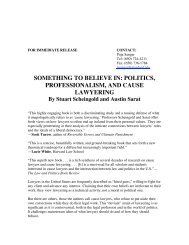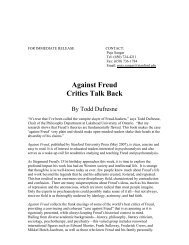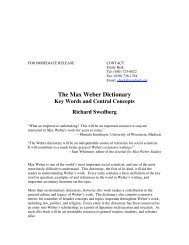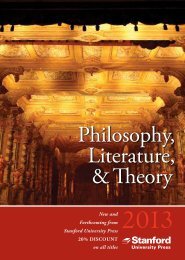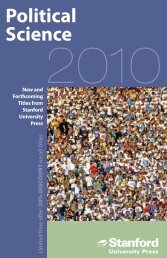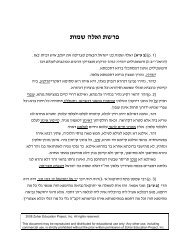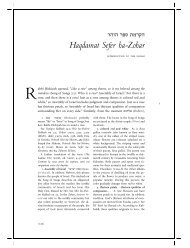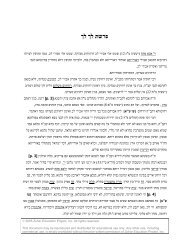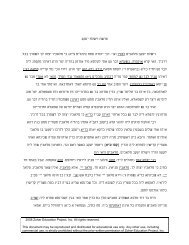Front Matter (PDF) - Stanford University Press
Front Matter (PDF) - Stanford University Press
Front Matter (PDF) - Stanford University Press
Create successful ePaper yourself
Turn your PDF publications into a flip-book with our unique Google optimized e-Paper software.
context for the publication of kabbalistic secrets is the great spiritual<br />
The<br />
that divided ProvencËal Jewry in the second half of the twelfth century:<br />
turmoil<br />
controversy over philosophy, and especially over the works of Rabbi Moses<br />
the<br />
(1135±1204). This con¯ict came to a head with the public burning<br />
Maimonides<br />
Maimonides' Guide for the Perplexed (by the Dominicans, but possibly with<br />
of<br />
tacit approval of anti-Maimonidean Jews) in 1232. The surroundingstruggle<br />
the<br />
the intellectual life of the ProvencËal Jewish elite for several decades. As<br />
engaged<br />
era's great halakhic authority and codi®er of Jewish law, Maimonides'<br />
the<br />
commanded tremendous respect. In many writings of the age, he is<br />
name<br />
referred to as ``the Rabbi.'' But his works raised not a few questions<br />
simply<br />
his degree of theological orthodoxy. Did Maimonides go too far in<br />
regarding<br />
insistence that the Bible's ascription of emotions to God, as well as bodily<br />
his<br />
was a form of anthropomorphism that needed to be explained<br />
attributes,<br />
Was it right that he derived so much of his wisdom from non-Jewish<br />
away?<br />
the Greek and Islamic philosophical traditions? Was he correct in<br />
sources,<br />
ancient rabbinic references to ``The Account of the Chariot''<br />
identifyingthe<br />
``The Account of Creation'' with metaphysics and physics as the philosophers<br />
and<br />
taught them? Did he have a right to dismiss certain old Jewish esoteric<br />
as inauthentic nonsense? Still more painful in this law-centered<br />
speculations<br />
how could the rabbi have given legal status to his own Aristotelian<br />
culture:<br />
views, seemingly insisting, in the opening section of his Code, that<br />
philosophic<br />
Jew who did not share them was either an idolator or a naive fool?<br />
any<br />
the heart of the Maimonidean controversy went deeper than all of these<br />
But<br />
touchingthe very heart of the philosophical notion of the God-<br />
accusations,<br />
Philosophy insisted on divine perfectionÐon the unchanging, all-knowinghead.<br />
all-capable quality of God. If perfect and unchanging, this God was neces-<br />
self-suf®cient and in no need of human actions of any sort. Why, then,<br />
sarily<br />
such a God care about performance of the commandments? How could<br />
would<br />
Torah centered on religious law, including so much of ritual performance,<br />
a<br />
the embodiment of divine will? Maimonides taught that indeed God<br />
represent<br />
no ``need'' for us to ful®ll the commandments. The chief purpose of religious<br />
had<br />
observance was educational, a God-given way of cultivating the mind to<br />
toward God. But once the lesson had been learned, some suspected, there<br />
turn<br />
be those who would come to see the form itself as no longer needed.<br />
would<br />
it was rumored that in some circles of wealthy Jewry in Muslim<br />
Moreover<br />
the abstractions of philosophy had begun to serve as an excuse for a<br />
Spain,<br />
lax view of the commandments and the details of their observance.<br />
more<br />
rabbis of Provence were deeply loyal to a more literalist readingof the<br />
Some<br />
and midrashic legacy, one that left little room for the radical rationalization<br />
Talmudic<br />
of Judaism proposed by the philosophers. Others had been exposed<br />
the esoteric traditions of the Rhineland and northern France, which stood in<br />
to<br />
with the new philosophy partly because they seemed to highlightÐ<br />
con¯ict<br />
Introduction<br />
xxxvi<br />
rather than minimizeÐthe anthropomorphic passages in Scripture and tradi-



